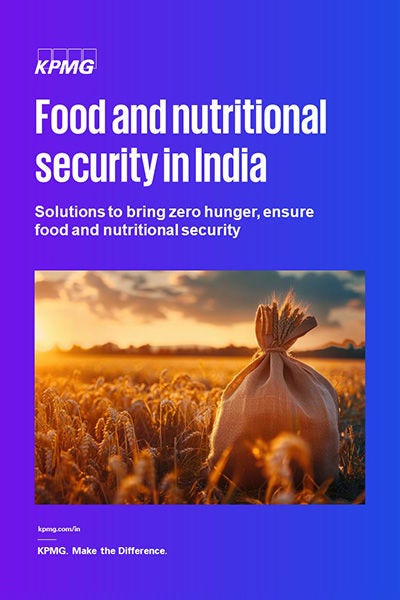Food security has been a critical aspect of India's public policy since Independence. While the country ranks among the top global food producers and exporters, millions still struggle with access to adequate and nutritious food. According to the 2024 Global Hunger Index (GHI), India ranks 105th out of 127 countries, highlighting the persistent challenges of hunger and malnutrition. Additionally, the UN’s State of Food Security and Nutrition in the World (SOFI) report states that over 19.46 crore people—approximately 13.4% of India’s population—are chronically undernourished.
Addressing these challenges and ensuring food and nutritional security require a comprehensive, multi-sectoral approach
Strengthening India’s public food distribution system (PDS)
One of the key strategies to achieve zero hunger is strengthening India’s public food distribution system (PDS). The Targeted Public Distribution System (TPDS) under the National Food Security Act (NFSA) has been instrumental in providing subsidized food grains to millions. However, challenges such as inefficiencies in supply chain management, leakages, and exclusion errors must be addressed through digital reforms, Aadhaar-linked beneficiary tracking, and improved last-mile delivery mechanisms.
Sustainable Agriculture
Sustainable agriculture is another crucial pillar in ensuring long-term food security. Promoting climate-resilient farming practices, enhancing irrigation efficiency, and encouraging crop diversification can help improve productivity while preserving natural resources. Additionally, supporting smallholder farmers through direct income support, improved market linkages, and access to quality seeds and fertilizers will contribute to a more robust food supply system.
Balanced Nutrition
Another major aspect of food security is ensuring balanced nutrition, particularly for vulnerable groups such as children, pregnant women, and lactating mothers. Government programs like the Mid-Day Meal Scheme (MDMS) and the Integrated Child Development Services (ICDS) play a vital role in addressing malnutrition. Expanding these programs with fortified foods, nutrition education, and community participation can further enhance their impact.
Technology and Innovation
Technology and innovation can also drive improvements in food security. The use of artificial intelligence (AI), blockchain, and remote sensing can help monitor food supply chains, reduce wastage, and optimize distribution. Digital platforms connecting farmers directly to consumers can eliminate middlemen, ensuring better prices for farmers and lower costs for consumers.
Additionally, achieving food security and zero hunger requires collaboration across various stakeholders, including government bodies, private sector players, non-governmental organizations (NGOs), and international agencies. Public-private partnerships (PPPs) can help scale up successful models of food production, distribution, and nutritional interventions. Global best practices, such as Brazil’s Zero Hunger Program, can offer valuable insights for policy refinement in India.
Lastly, raising awareness about sustainable consumption and reducing food waste are essential. Strengthening food banks, promoting community kitchens, and encouraging responsible consumer behavior can significantly impact food security at the grassroots level.
India has made progress in improving food availability, but significant challenges remain in accessibility and affordability. A multi-pronged approach integrating efficient distribution, sustainable agriculture, nutritional programs, technology-driven solutions, and strong policy frameworks is essential to achieve zero hunger and food security for all. With concerted efforts, India can move closer to eradicating hunger and malnutrition, ensuring a healthier and more prosperous future for its citizens.
Food and Nutritional Security in India
The report outlines solutions for achieving zero hunger and ensuring food and nutritional security through a multi-stakeholder approach, addressing gaps in access, distribution, and agricultural sustainability

Key Contact
Himanshu Rattan
Partner and Lead – Food, Agri & Allied Services, Government & Public Services
KPMG in India
Access our latest insights on Apple or Android devices


